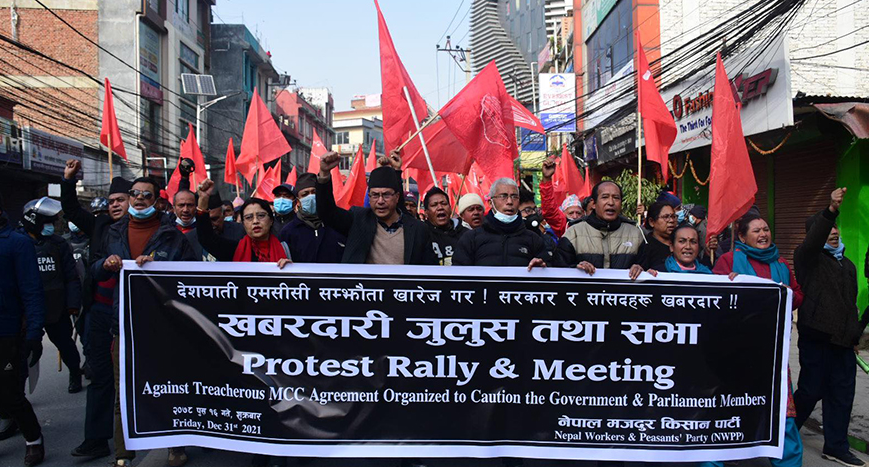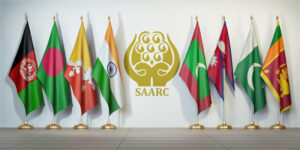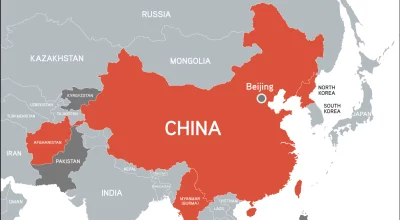
America’s geo-economics and geo-military program Millennium Challenge Corporation (MCC) has not been getting positive feedback from Nepali people. Though it was ratified by the parliamentary vote last year, people are concerned about how can they disrupt it before the spillover of its harmful effect.
MCC is a dangerous strategic program of the American establishment that has a malign parochial interest to fulfill its geo-military goal creating chaos and instability, particularly in the developing world. Global experiences also demonstrate that MCC had created more insecure and burden situation in many countries. Knowing the international situation, changing global context, and the significance of the pertinent issues, now Nepali people are in a mood and situation to fail in the implementation of the MCC program before it takes a strong ground.
The US Congress formed the Millennium Challenge Corporation (MCC), a bilateral autonomous US foreign aid agency, in 2004. It is said distinct from the State Department and USAID. It claimed that possessing sound economic policies and the potential for economic growth is one need for eligibility for the grant. In outside, its focus is on reducing poverty through economic expansion. The rigorous selection procedure incorporates ratings from outside sources in 17 distinct categories, including fiscal policies, the extent of corruption, and the strength of the rule of law.
A day after the Millennium Challenge Corporation (MCC) was approved, the Nepal government reaffirmed its stance that, in keeping with the spirit of Nepal’s foreign policy, no power would be permitted to use Nepali soil against neighbor and other friendly countries.
Nepal has contributed $130 million to the program and has received a grant from the MCC in the amount of $500 million. With the help of this $630 million scheme, as per their claim, Nepal and the region will be able to exchange power more easily, maintain good road conditions, and encourage investment to spur faster economic growth. This program’s two largest projects were the Road Maintenance Project (RMP) and the Electricity Transmission Project (ETP). The projects are carried out by MCA-Nepal, which is responsible to both the government and the people of Nepal. To maintain transparency, MCC does monitor the processes and progress, and due diligence is used when completing the project. Last but not least, it is not in Nepal’s best interest to complete the projects, notably it will increase geopolitical conflict.
This is a momentous development in Washington’s strategic alignment, to start with. Nepal has unquestionably evolved into a crucial pivot in the US’s policy as it has made every effort to promote its Indo-Pacific Strategy. The US wants to utilize the MCC to include Nepal into the alliance between New Delhi and Washington to oppose their conflicting parties.
Practically all of the Indian media was silent when the US gave Nepal till February 28 to ratify the MCC agreement. The US’s support of “India’s sustained rise and regional leadership,” which was emphasized in the report on Washington’s Indo-Pacific Strategy, is obviously connected to this.
The MCC is also a tool to divide Nepal’s political system to create the ground for an instability. For months, Washington had used the accord as a springboard to incite political unrest in the nation. By continuing to use the MCC as bait, it is likely to bolster US-friendly forces in their attempt to seize control of Nepal.
Economically, the pact will make Katmandu more dependent on New Delhi even while it promises to improve infrastructure, particularly in the southern region of the country. This goes against Nepal’s quest for economic independence and could encourage semi-colonial situation.
The geostrategic environment could possibly change as a result of the MCC’s implementation. The US has already demonstrated its propensity to encircle other powers by luring in its neighbors.
In addition, Washington has been effective in cultivating pro-US forces in Katmandu after years of threatening and promising. The current difference in opinion among Nepali lawmakers, experts and the media about the MCC pact shows a definite shift in mindset.
In response to public outcry, Nepal’s previous coalition government released a “interpretive declaration” in which it stated that the country would not join any strategic, military, or security alliance, “including the Indo-Pacific Strategy,” of the US. However, observers noted that the statement is not referenced in the MCC agreement. It seems clear which text will prevail if there is a conflict between the two.
The MCC could allow US military forces to further pressure Nepal in accordance with the compact. This has already been happening for years in a variety of ways. The US is clearly trying to hinder the BRI’s development in South Asia and jeopardize the security and stability of southwest border.
The cancellation of the Sri Lanka MCC Compact was applauded by many people in Nepal. An opposition-led information campaign painted the cooperation as a scheme to undermine Sri Lanka’s sovereignty. In 2020, a new administration established a committee to review the compact agreement. The committee made the suggestion that the administration reject it without reservation. The MCC withdrew from the island nation as the conflict over the compact in Sri Lanka grew worse.
The US and Nepal’s ratification of the MCC treaty does not necessarily indicate that Nepal will be on a fast track for social progress, but it does mean that the South Asian country will be more at danger of being a flashpoint for potential geopolitical problems.
In fact, this is what many people in Nepal are now worried about: the possibility that the US may use a variety of military and diplomatic coercive measures to force Nepal to join the US-led ill-intentioned security camp.
The MCC treaty is obviously a colonialist tool used by the US to try and use Nepal as its new geopolitical pawn in furthering Washington’s so-called Indo-Pacific Strategy, despite its cover as economic help.
As the world closely monitors the ongoing conflict between Russia and Ukraine, in which the US has played a significant role in inciting hostility and tension, it is imperative for South Asia to be vigilant against the so-called US aid that could do nothing but incite regional tension and endanger regional peace and development.RSS















